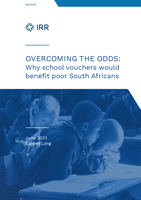
"Overcoming the Odds: Why school vouchers would benefit poor South Africans" is a compelling report that advocates for a transformative change in South African education. The report contends that implementing a school voucher system would harness the power of market forces by enabling parents and students to make their own choices while promoting enhanced accountability.
The report, launched during an online briefing, underscores the deplorable state of basic education in South Africa. It highlights the country's consistently poor performance in international benchmark tests and alarming school throughput rates. Particularly concerning are the significant disparities in early-grade literacy and numeracy between students attending free schools versus fee-paying schools.
Early-grade reading and numeracy are prioritized due to their crucial role in the learning process. Children who struggle in these fundamental areas often face challenges comprehending other subjects as they progress through grades, leading to disengagement and high dropout rates among impoverished students.
Furthermore, the report emphasizes the government's inability to deliver quality education to the underprivileged despite substantial investment. This failure exposes the need to minimize state involvement in basic education, transforming the sector into a 'poverty trap.' To rectify this, the report argues for reducing state intervention as much as possible.
The report identifies several factors contributing to outcome disparities, such as inadequate teacher content and pedagogical knowledge, teacher absenteeism, and the influence of teacher unions, which disproportionately affect free schools. These findings underline the overall lack of accountability at various levels that contributes to poor outcomes among disadvantaged South Africans.
Consequently, the report posits that implementing a school voucher system represents a viable solution. By reducing the state's managerial role and allowing the Department of Basic Education to focus on targeted interventions for early-grade reading and numeracy, vouchers can leverage market forces to address the accountability problem.
A voucher system would incentivize schools to compete for vouchers, rewarding high performance and penalizing poor performance. Additionally, it would empower parents to choose the educational path they believe is best for their child, aligning with the principles of a liberal democracy.
The report aims to propose potential solutions to South Africa's education crisis and contribute a plan that can transform the education system into the envisioned "great engine of personal development" that Nelson Mandela envisioned. By embracing the concept of school vouchers, the report advocates for a radical change that has the potential to positively impact the educational landscape of South Africa.
